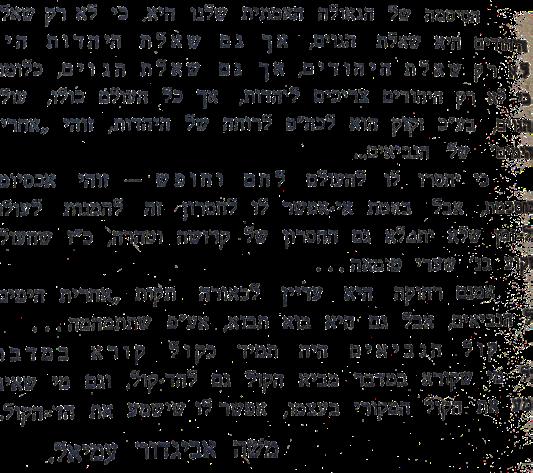
2 minute read
Rabbi Daniel Kaplan
When I walked into the Gush beit midrash for the first time on a grade 10 Israel program, I had no intention of going to yeshiva after high school. But when I was introduced to Rav Yehuda Amital zt”l everything changed. I was in awe!
It was surreal to personally meet a man who survived the atrocities of the Holocaust with unwavering faith in Hashem, a Torah giant leading a Hesder Yeshiva in Gush Etzion. Rav Amital was a man of vision, integrity and courage. He reminded me of Rabbi Akiva; even in difficult times, he was hopeful and optimistic about the future of Am Yisrael
Advertisement
In his eulogy for Rav Amital, Rav Aharon Lichtenstein said: ”As the Kaddish deals not with death but with life, so too his was a Torah of life. In the depths of his soul, Rav Amital continuously felt the impact of the Holocaust, and this prodded him to make sure that here in Eretz Yisrael he would serve G-d in an atmosphere of life, rather than in a climate of death.”
His path was one of life and joy, a way of serving G-d that resonated with me. And so yes – after high school, I returned and studied in the Gush and had the privilege of soaking up Rav Amital’s Torah and way of life. I still get goosebumps when thinking of his sichot and powerful davening on Rosh Hashanah and Yom Kippur. And when I’m struggling during difficult times, I take one of his books off the shelf and find myself infused with his hope and joy. I will be forever grateful to have been his student.
Dr. Shaena Abramowitz is an experienced educator who lives on the Arugot Farm in Judea with her husband, Ari, and children, Dvash and Shilo.
When buying fruits and vegetables abroad, is it better to buy Israeli produce or to actually avoid buying it, because terumot and ma’asrot may not have not been taken from the fruit?
Rambam writes (Hilchot Terumot 1:22) that fruits exported overseas are exempt from terumot and ma’asrot. The Ra’avad disagrees and says there is a rabbinic obligation to tithe the fruit. Other Rishonim also rule that terumot and ma’asrot must be taken from Israeli exports (e.g. Rosh, Sefer Year’im, Sefer HaChinuch, Rabbeinu Yonah). Rambam’s position invites deeper analysis. Terumot and ma’asrot must be taken from fruit in Eretz Yisrael after the action that makes them ready for use (e.g., picking them from a tree). It seems from Rambam’s wording that there is no such obligation if the produce is being exported.
However, most Acharonim argue that simple logic dictates that if fruit already have an obligation to be tithed in Eretz Yisrael (because they are ready for use), they should retain that obligation outside of Israel too. According to them, even the Rambam would agree that there is an obligation to tithe such fruit in our generation, because the action that made them ready for use was performed in Eretz Yisrael.
The Maharsham (1:72) writes that even those with a stringent approach to tithing fruits in Eretz Yisrael would exempt







